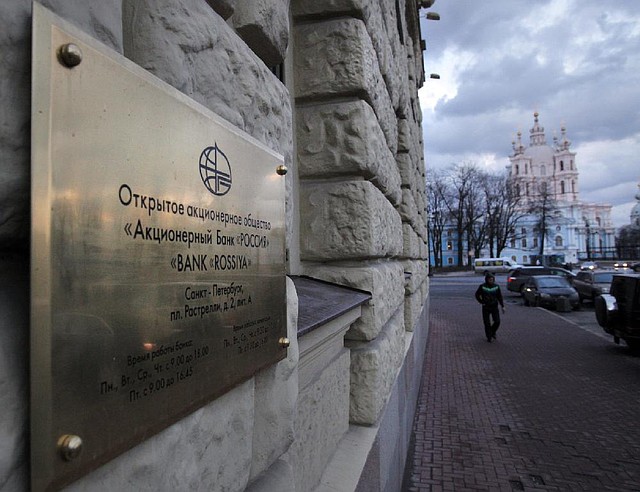Sanctions begin to affect banks, stocks in Russia
A person walks outside the head office of Bank Rossiya in St. Petersburg, Russia, Friday, March 21, 2014. Two Russian banks, including Bank Rossiya, the Russian lender which was put on the Treasury's sanctions list, said Visa and MasterCard have stopped providing services to them. Bank Rossiya is a private bank owned by Yuri Kovalchuk, considered to be Russian President Vladimir Putin's longtime friend and banker. With about $10 billion in assets, Rossiya ranks as the 17th-largest bank in Russia and maintains numerous ties to banks in the United States, Europe and elsewhere. (AP Photo/Elena Ignatyeva)
Saturday, March 22, 2014
MOSCOW - Russia conceded Friday that it’s possible it will scrap plans to tap international markets for money this year as it counts the cost of the sanctions imposed in the wake of the annexation of Crimea.
Fears about Russia’s economic outlook have ratcheted up this week as the country absorbed Crimea after Sunday’s referendum that overwhelmingly supported the move. The West considers the vote illegitimate and has imposed sanctions in response.
The sanctions are already being felt on the streets of Russia as Visa and Master-Card stopped serving two Russian banks, a day after the U.S. ordered sanctions against about two dozen people associated with President Vladimir Putin.
Russian shares continued to falter Friday, and the benchmark MICEX index was down 2 percent in late afternoon trading. The Russian stock market has lost more than 10 percent this month amid growing tensions between Russia and the West.
In comments carried by Russian news agencies, Russia’s Finance Minister Anton Siluanov became the first Russian official to admit to an economic fallout from the sanctions.
Siluanov said the country may scrap plans to raise $7 billion worth of bonds this year if oil and gas revenue remains steady. Moscow “may decide to give up external borrowing,” he said.
The economic sanctions ordered Thursday by President Barack Obama targeted 20 people, including Putin’s chief of staff and four influential businessmen who are believed to be his lifelong friends, and also a major Russian bank that provides them support.
Two Russian banks, including Bank Rossiya, the Russian lender that was put on the U.S. Treasury Department’s sanctions list, said Visa and MasterCard have stopped providing services to them. U.S. officials described Russia’s 15th-largest bank, with $12 billion in assets, as a “personal bank for senior officials of the Russian Federation.”
Clients of another Russian lender, SMP, woke up Friday to discover that their bank cards were not as useful as they were the day before. In a statement, it said Visa and MasterCard stopped providing their services “without prior notification.” SMP’s coowners, Arkady and Boris Rotenberg - billionaire brothers and childhood friends of Putin - were hit by the U.S. sanctions.
The bank, which is in Russia’s top 40 with $5 billion in assets, said it had no assets in the United States and described Visa and MasterCard’s actions as “illegitimate” because the bank, unlike its owners, was not covered by the sanctions.
Customers in the two banks won’t be able to use cards backed by Visa and MasterCard to buy products in shops online or withdraw cash from ATMs beyond their own bank’s. They can also get cash inside their banks’ branches.
Putin has ordered the country’s central bank to help clients of Rossiya. While denying he had an account there, he ordered the central bank to “take the bank’s clients under protection and provide all possible assistance to them.”
Describing Rossiya, which was rumored to serve nearly everyone in Putin’s close entourage, as “just an average bank,” Putin said he had never had an account there but promised to open one “first thing on Monday” and asked for his salary to be transferred there.
Russia’s central bank earlier said that the blacklisting of Rossiya and its transactions by the U.S. “does not have a serious bearing on the lender’s financial stability.”
Ratings agency Fitch warned that the sanctions could weigh on Russia’s economy as it followed Standard & Poor’s in warning Russia that it may have its credit rating downgraded. In a statement,Fitch said it has revised down its outlook for Russia’s debt to reflect the potential effect of sanctions on Russia’s economy.
“Since U.S. and EU banks and investors may well be reluctant to lend to Russia under the current circumstances, the economy may slow further and the private sector may require official support,” Fitch said.
Lower ratings are important because they can make a country’s borrowing costs more expensive. Fitch operates a 23-notch rating system, and Russia’s BBB rating ranks ninth on that scale, two above what is considered to be junk status.
Business, Pages 27 on 03/22/2014
